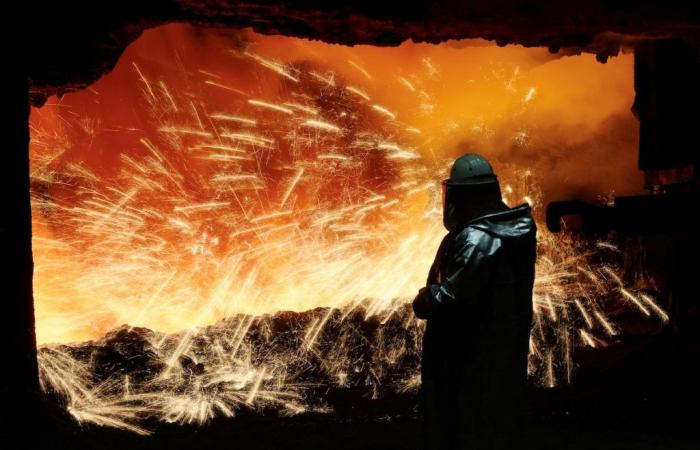
Thyssenkruup is a historic steel giant and has sounded the alarm: it fears for the future of steel activity in Germany. The business of large blast furnaces and rolling mills are the historical roots of the company, which with some 27,000 employees in this sector is the largest steel manufacturer in the country. “It is necessary for Germany and Europe to maintain the steel industry. Steel is at the beginning of many value chains. From a macroeconomic perspective, a competitive steel industry is therefore indispensable, also for reasons of resilience and autonomy.” The person who issues this warning to EL PAÍS during a video call interview is Miguel Ángel López Borrego, CEO of Thyssenkruup. “If we do not act, steel production in Germany as we know it will cease to exist. That is why major changes are necessary,” he emphasizes.
The German government and the state of North Rhine-Westphalia, where the company is based, are subsidising the green conversion of the steelworks to the tune of around 2 billion euros. But this is not enough. The group plans to reduce steel production and has decided to sell part of its steel division to EPCG, owned by Czech billionaire Daniel Křetínský. Specifically, the supervisory board of Thyssenkrupp decided, against the votes of employees, to initially sell 20% of the shares in Steel Europe, as its steel division is called. The decisive factor was the double voting rights of the chairman of the supervisory board, Siegfried Russwurm. EPCG will subsequently acquire a further 30% and thus establish a 50-50 joint venture with Thyssenkrupp on equal terms. In the 2022/2023 financial year, the steel division generated revenue of EUR 12.4 billion and operating profit (EBIT) of EUR 320 million.
This decision is part of the group’s savings plans, since the times when Germany was the center of global steel demand are long gone. Added to this is the fact that it can no longer count on cheap energy sources like national coal used to be. Furthermore, the company remembers that Thyssenkrupp is more than steel. It is an industrial group with many different business areas with around 100,000 employees, so they want to prevent the steel business from continuing to weigh down other activities.
In total, Thyssenkrupp operates four blast furnaces in Duisburg. Two others belong to Hüttenwerke Krupp Mannesmann (HKM), a joint venture with competitors Salzgitter and Vallourec. Together they produce about 11.5 million tons of steel annually in the Ruhr basin, largely destined for the automotive sector. However, this industry needs less and less steel because electromobility is looking for lighter materials. “Thyssenkrupp is closely linked to the automobile industry, so any change in demand naturally has a very strong impact on the use of our capacity,” declares the manager born in Frankfurt but of Spanish nationality.
In the last three years, Thyssenkrupp has only sold an average of between 9 and 9.5 million tons of steel. Demand is too low and costs too high. It must face the energy price crisis triggered by the start of the war in Ukraine and an increase in steel imports from Asia, so restructuring was a matter of time. “With the realignment of Thyssenkrupp Steel, which the council is currently developing, we are faced with this new reality,” says López. “The readjustment plans to reduce production capacities from 11.5 million tons to a shipment load of up to 9.5 million tons annually,” he adds. As a consequence, there will also be “job losses that are not yet quantifiable,” as Thyssenkrupp Steel Europe announced a few weeks ago and which the manager himself acknowledges. “The steel executive council is developing a business plan that will translate into concrete restructuring measures. These will be discussed, of course, with the workers’ representatives,” he answers without wanting to go into more details.
The works council and the IG Metall union have already declared war on López Borrego over this matter, fearing that the group will try to exit the steel business at the expense of the workers. They also accuse him of a lack of transparency in the negotiations with Křetínský. Something he denies. “We maintain and will maintain dialogue with workers’ representatives. This applies to both regular committee meetings and informal conversations,” he states. “We respect all existing contracts and our stated objective remains to avoid layoffs. “It has always been this way at Thyssenkrupp and we do not want to change it now.”
Neutrality in emissions
The CEO insists on the urgency of finding a way out. “We need a sustainable solution, not at some point, but now. The situation will not improve on its own, on the contrary,” he warns. “Our common goal is to create a high-performance, profitable and future-oriented steel company, which reduces the costs of decarbonization to a more competitive level and accelerates the green transformation on the path to emissions neutrality.”
Within these plans, the executive values the Spanish market positively because it meets “good conditions because renewable energy and hydrogen can be produced there at competitive prices.” “We expect strong growth because many plants are being built in Spain to convert renewable energy into other types of energy.” Thyssenkrupp’s plans come at a time when the German economy remains very weak. The Government expects growth of 0.3% for the current year and German businessmen are demanding a whole plan of measures – such as reducing bureaucracy, improving digitalization and modernizing the railway network for more efficient freight transport – and They remember the importance of Germany being an industrial, exporting and innovative country. “Productivity must be improved in Germany. We have to sit down with the Government and discuss how we can make the economy more productive,” he concludes.
Follow all the information Economy and Business in Facebook and xor in our weekly newsletter





